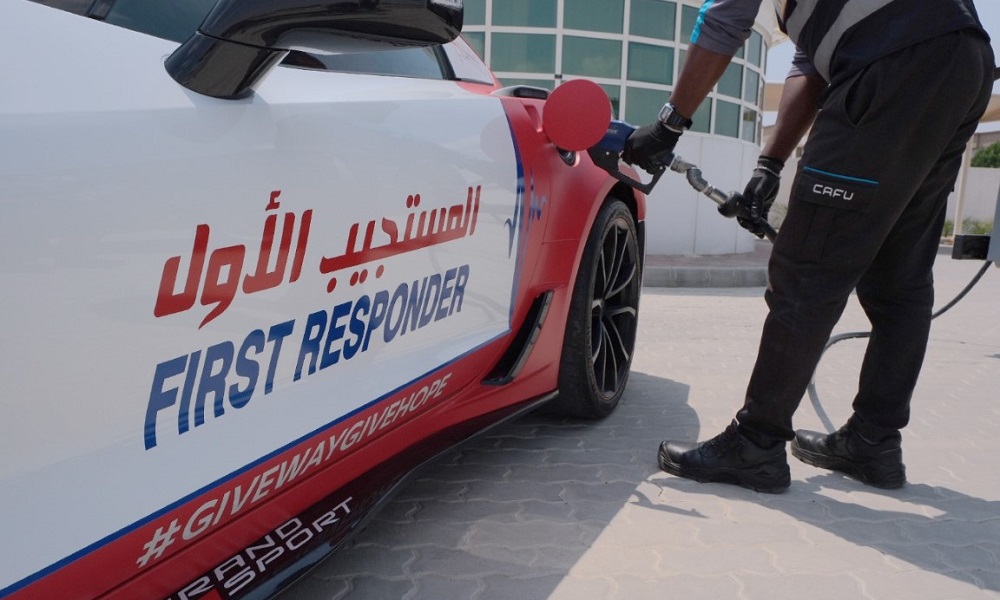In four short years, CAFU has progressed from being an ambitious start-up to one of the leading pioneers in mobility in the market. As the owner of its own famous blue fleet of fuel delivery and automotive service trucks it has risen to the status of market leader in its field, but it is also at the forefront of companies applying a sophisticated mixture of data and number crunching to power its operation and serve customers.
During the Fleet and Mobility Summit, Alaa El-Huni, Head of Partnerships & Expansion at the on-demand fuel and services firm, explained how it works.
“Through intelligence and leveraging data and telematics information we can better services,” he said, adding: “I think most people have seen our fuel delivery trucks, but we can offer a range of other services to fleets and to consumers – and all through tech enablement. Which basically means we try to integrate connectivity into the vehicles to keep them connected to other vehicles and be able to provide our services where and when they are needed.”
CAFU emerged from the COVID crisis as part of the critical mobility infrastructure in the market, providing on-demand fuel and maintenance to consumers and private customers alike. For fleet customers, CAFU is now their insurance policy when it comes to ensuring vehicles are being fully utilised where in the past they would have had to have taken them out of operation.
Since the beginning of 2021, it has also integrated fellow mobility experts ekar’s Mobility OS into its own infrastructure to flag up when ekar vehicles are running with 25% or less fuel in the tank. This, in turn, is signalled to CAFU; generating an order for refuelling and the need for a ‘pilot’ to drive out to the vehicle.

“We are able to know when an ekar vehicle or any car needs fuel and through connectivity we are able to place that order. This is just a small example of how through intelligence and leveraging data and telematics information we can better services,” said El-Huni.
Whether it is a fleet customer or its own growing fleet of vehicles, CAFU is providing an approach to keeping vehicles on the road longer that simply did not exist in the market a few years ago.
El-Huni can see the use of vehicle data from on-board systems such as telematics as continuing to expand the hours vehicles are on the road, again, a particularly important concern for its business customers.
“We operate 24 hours a day. Consumer customers like to order during the day, but B2B customers like to order at night – and it works very very well for us: we keep our own utilisation up by catering to both. Fleets operate their vehicles significantly more, so have a lot more touch points with fleets. And what we understand of them is significantly higher than what we understand of consumers,” he explains.
“We might have a daily touchpoint, even multiple times a day or several times throughout the week. Our regular B2C customers it is maybe two or three times a week, four or five times a month.”
Within the CAFU ecosystem, customers gain access to the service through the app and pilots also interact with the operation through their own app. Behind this layer are the AI-enabled routing algorithms and dispatching software that co-ordinate the movement of the vehicles.

Fleet owners using the service have their own corner of this data-driven network through B2B dashboards that allow fleet owners to be able to know the exact utilisation of every single one of their assets.
This includes: “When they got fueled, when they got washed, when the tyres got changed, and so on and so forth. This allows them to drill down on a per asset per driver per hour basis. They’re able to know that driver 74 of asset 36 is a lot more efficient than another driver,” he says.
“And one reason this is important is because we do it for our own selves, right? It’s how we manage our own fleet – and we really want to know how do we maximise the utilisation of our trucks? How do we leverage that inventory in the most efficient way.”
He continues: “I think the easiest job in the world is the salesperson at CAFU that has to sell to fleets everyday. They go out to fleets and explain to them if you have a fleet of 100 vehicles and each one of your vehicles has to drive three kilometers and takes 10 minutes, we will save you 300 kilometers and a thousand minutes a day. And the same applies to any of the other services that we provide. If they need an oil change, we go on site and save them that half day or one day it’s not out there being productive.”
“From a fleet and B2B perspective this is really where our real value is. On the consumer side, that’s really where we have to go and educate.”



